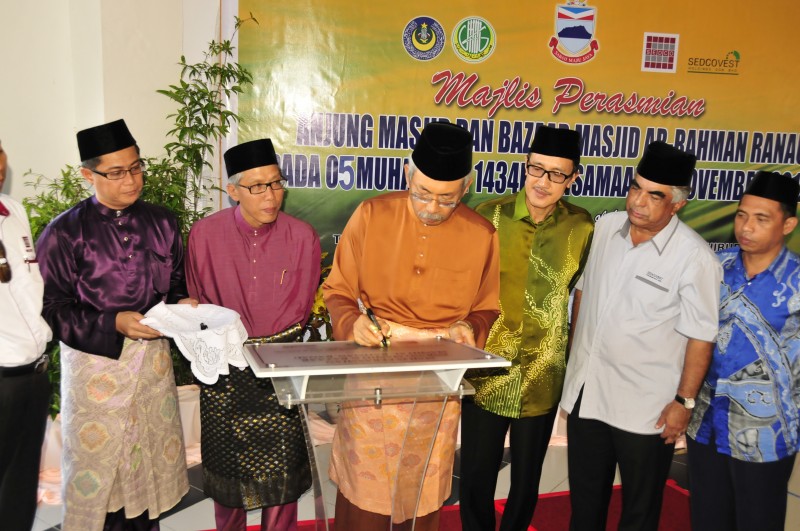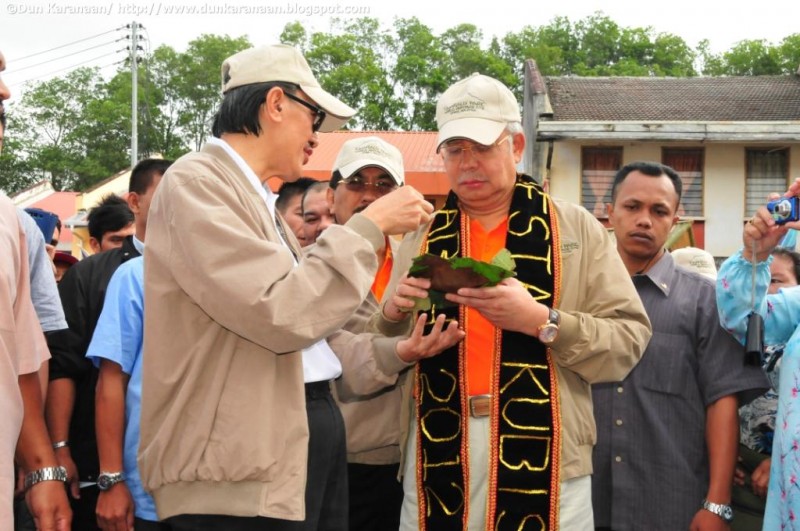jessica2012-10-15T16:22:34+08:00KUDAT: The most-awaited agriculture-based projects which are currently being implemented by the state government under Sabah Development Corridor (SDC) in the northern part of Sabah heralds a new, bright future for thousands of people in this area.
Statistics indicated that, for now, northern Sabah — covering the districts of Kudat, Kota Marudu and Pitas —still has a high population of hardcore poor or a high incidence of poverty.
But thanks to the 1Malaysia’s Government Transformation Programme (GTP) initiative taken by Prime Minister Datuk Seri Najib Tun Razak, this region is now enjoying tremendous growth and development, particularly in the agricultural sector.
In what is seen as a new dawn for this area and its people, Datuk Dr Mohd Yaakub Johari, Chief Executive, Sabah Economic Development and Investment Authority (Sedia), a one-stop authority for SDC, said the state government under the leadership of Chief Minister Datuk Seri Musa Aman, who is also chairman of Sedia, has devised a special strategy in tackling poverty in northern Sabah.
One of the SDC’s key projects for that purpose is the agropolitan project in Pitas, he told Bernama, here.
While describing Sabah’s agriculture sector policy as among the best in the country, Mohd Yaakub said, “This project will transform the infrastructure landscape of the coastal areas in northern Sabah, particularly in raising the residents’ income as well as assist in reducing the poverty level.
“Under the Ninth Malaysia Plan (9MP), we will develop four roads totalling 53.1 kilometres (km) in four villages to ensure the project’s success,” he said.
He said the completed roads are the 8km road that connects Sosop and Mandamai Bai (Pitas) costing about RM15 million, the 7.6km Jalan Kampung Kiandut-Torungguh (RM11.6 million) and the 29.2km Jalan Jambu-Liu-Malubang costing RM26 million.
The other road project is the upgrading of the 8.3km Jalan Pantai-Delima costing some RM9.3 million which is targeted for completion by year-end, he said.
Mohd Yaakub said besides building roads, residential development are also provided especially for participants of the Pitas agripolitan project, and to date a total of 260 units of houses were completed.
“We have also provided facilities such as electricity supply to the houses to ensure the residents enjoy the basic facilities for a comfortable living,” he said.
According to him, under the Pitas agropolitan project, focus is given to rubber planting on a large scale. Towards this end, he said a 3,600-hectare (ha) area has been allocated for development in Bengkoka, which is expected to benefit 900 people.
“A portion of the land was planted with rubber trees which have already been tapped, and the minimum income for each family is about RM3,000. This is a good indication for participants of the Pitas agropolitan project,” he said.
Mohd Yaakub said the development of infrastructure facilities in the area does not only provide convenience to local residents but “gives the signal to investors to invest in the area”.
“This is important because if investors do not come here to invest, then the government will carry the burden of allocating the development expenditure.
“Whatever we have provided, whether roads, electricity or water supply, all these are hoped to be able to convince entrepreneurs who have the capital to invest…and together with the local residents to increase the economic standard in a sustainable way,” he said.
Mohd Yaakub said under the Tenth Malaysia Plan (Second Rolling Plan), SDC also places emphasis on sea cucumber farming in four selected coastal villages involving 80ha of land and 50 participants.
“If this project is successful, it is able to provide income of up to RM1,000 per month to the participants.
We also plan to develop shrimp farming with private entrepreneurs in Telaga covering a 536ha area.
“The shrimp farming, involving 400 participants, will also able to generate income up to RM1,409 per month,” he said.
Apart from the agropolitian project, Mohd Yaakub said there are other programmes for the area designed to address the issues of poverty “in a manner that could be sustainable”.
He said this was made possible following the alignment of the GTP introduced by Najib and the SDC programmes.
“Firstly, we have identified swiftlet farming.
In fact we have just tested the enthusiasm of the local people in Sabah.
“A few days ago we organised a course on swiftlet farming, and it was very well received and we have to organise two sessions each for about 100 participants.
“People at various levels of educational background participated in this seminar.
We believe that swiftlet farming has great potential and will benefit the people in the northern areaa such as Kudat, Kota Marudu and Pitas,” he said.
Mohd Yaakub said these were targeted areas for swiftlet farming and hoped this project would become a reality soon.
“For this purpose, we will have areas for bird’s nest processing unit, a hatchery, nursery and feed production unit…it’s so complete.
That’s why we will invite private investment for this swiftlet project,” he said.
He said there was also a proposal to establish an Integrated Marine Fish Culture project in Limau-Limauan, Kudat.
In this respect, Mohd Yaakub said Sabah Fisheries and Fishermen Development Cooperative (Ko-Nelayan) has identified some 400ha of land and sea as suitable for marine fish cage farming in Kudat.
The project will consist of a hatchery, nurseries, grow-out cages, a feedmill and production facility of live feed, he added.
Mohd Yaakub said the hatchery is expected to produce 135 million of hybrid and high grade fish fingerlings to supply various fish cage culture operators in Sabah.
He said the cages are expected to produce 28,000 metric tonnes annually of hybrid and high-grade, high-value fish for export to China and Hong Kong. — Bernama
Source : Borneo Post
 YB Datuk Masidi Manjun who is also the State Assemblyman for N30 Karanaan, Ranau attended the Anjung Masjid Ar-Rahman Ranau official opening event on the 19th November 2012. The officiating ceremony was done by Tuan Yang Terutama Tun Datuk Seri Panglima Hj Juhar Hj Mahiruddin, Yang DiPertua Negeri Sabah.
Tuan Yang Terutama Tun Datuk Seri Panglima Hj Juhar Hj Mahiruddin, Yang DiPertua Negeri Sabah telah berkenan merasmikan Anjung Masjid Ar-Rahman Ranau pada 19 November 2012. Turut hadir dalam acara tersebut adalah YB Datuk Masidi Manjun merangkap ADUN N30 Karanaan, Ranau.
YB Datuk Masidi Manjun who is also the State Assemblyman for N30 Karanaan, Ranau attended the Anjung Masjid Ar-Rahman Ranau official opening event on the 19th November 2012. The officiating ceremony was done by Tuan Yang Terutama Tun Datuk Seri Panglima Hj Juhar Hj Mahiruddin, Yang DiPertua Negeri Sabah.
Tuan Yang Terutama Tun Datuk Seri Panglima Hj Juhar Hj Mahiruddin, Yang DiPertua Negeri Sabah telah berkenan merasmikan Anjung Masjid Ar-Rahman Ranau pada 19 November 2012. Turut hadir dalam acara tersebut adalah YB Datuk Masidi Manjun merangkap ADUN N30 Karanaan, Ranau. 




